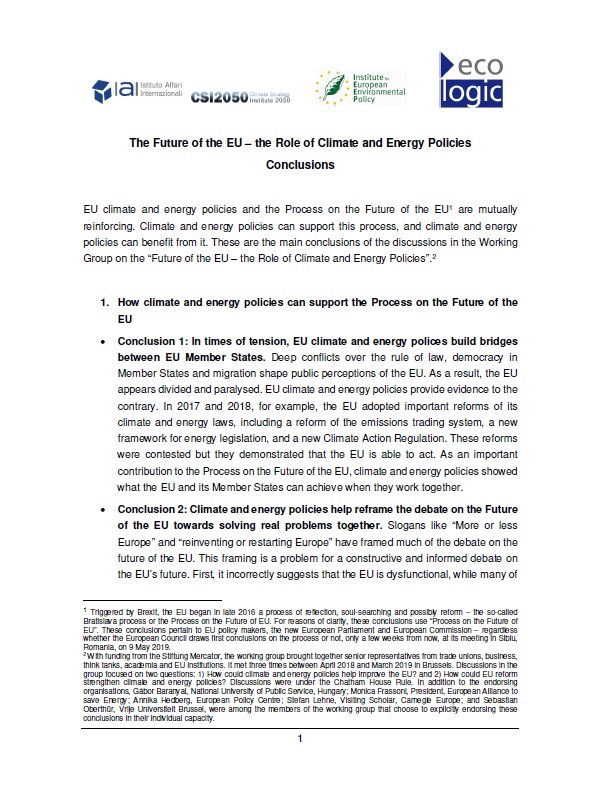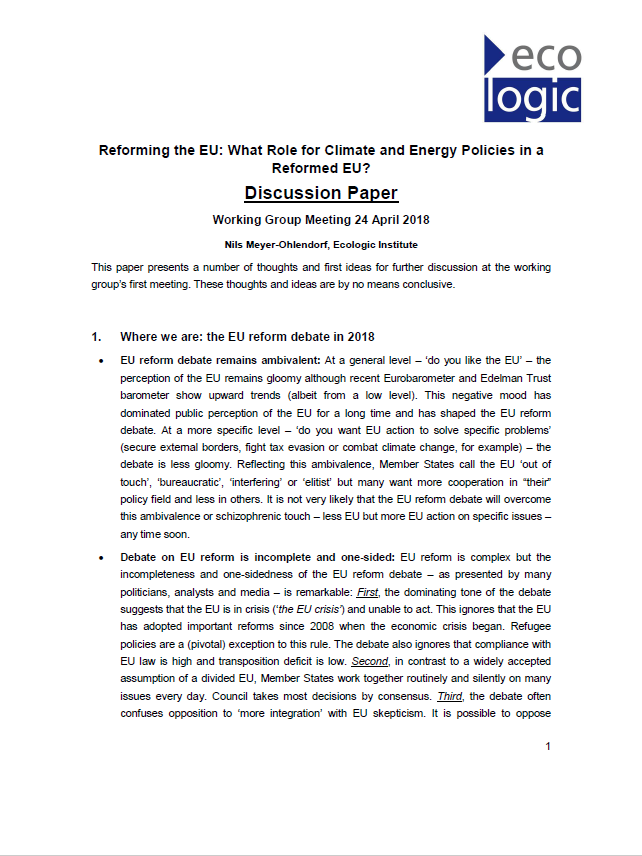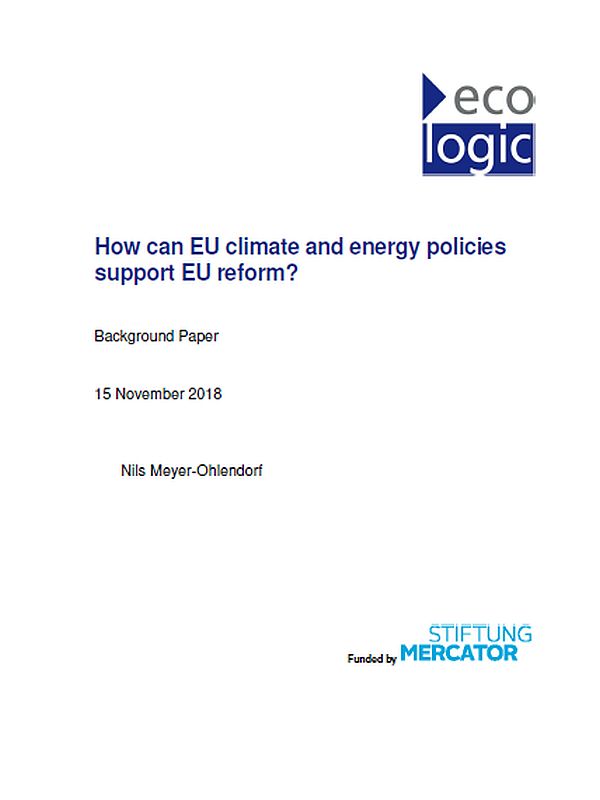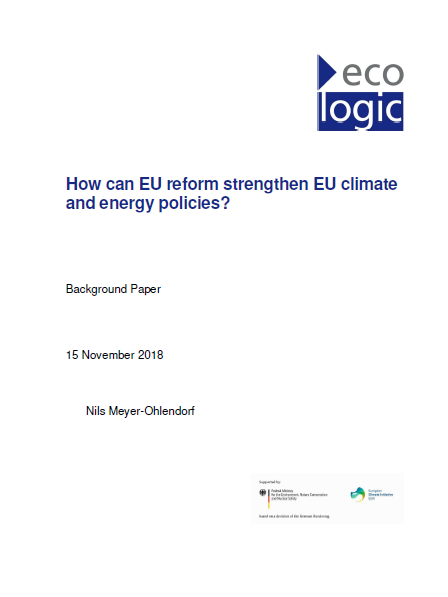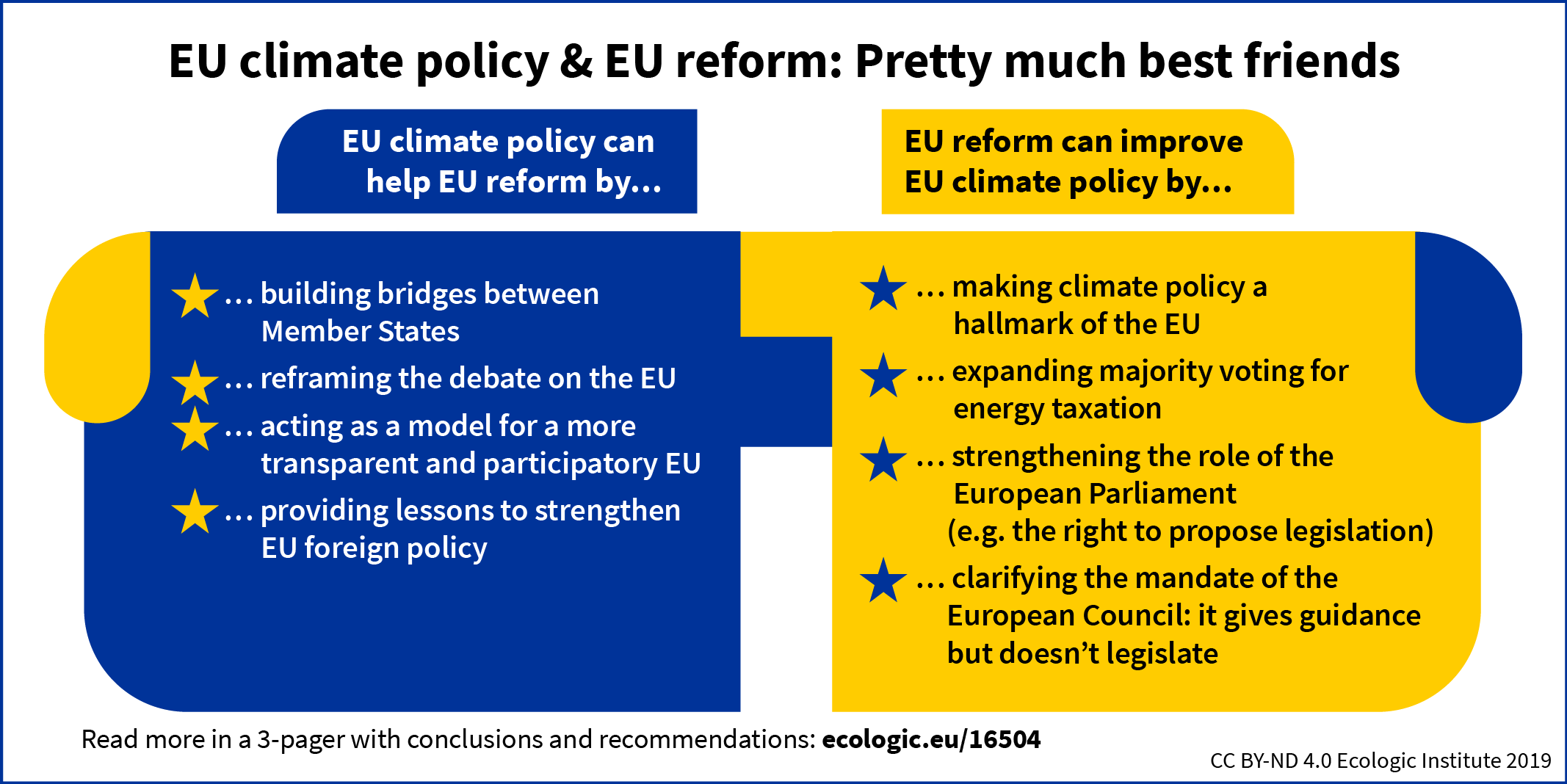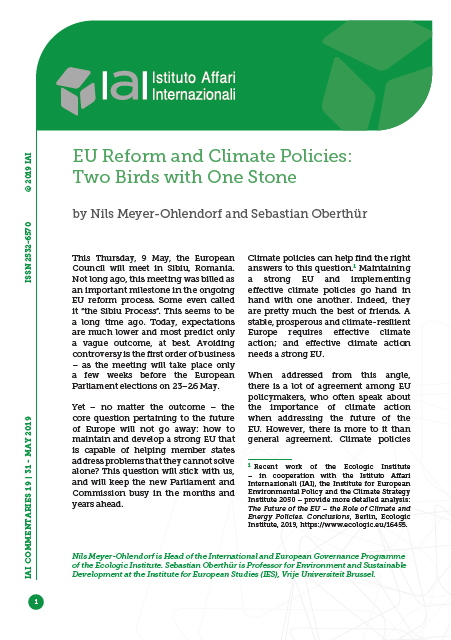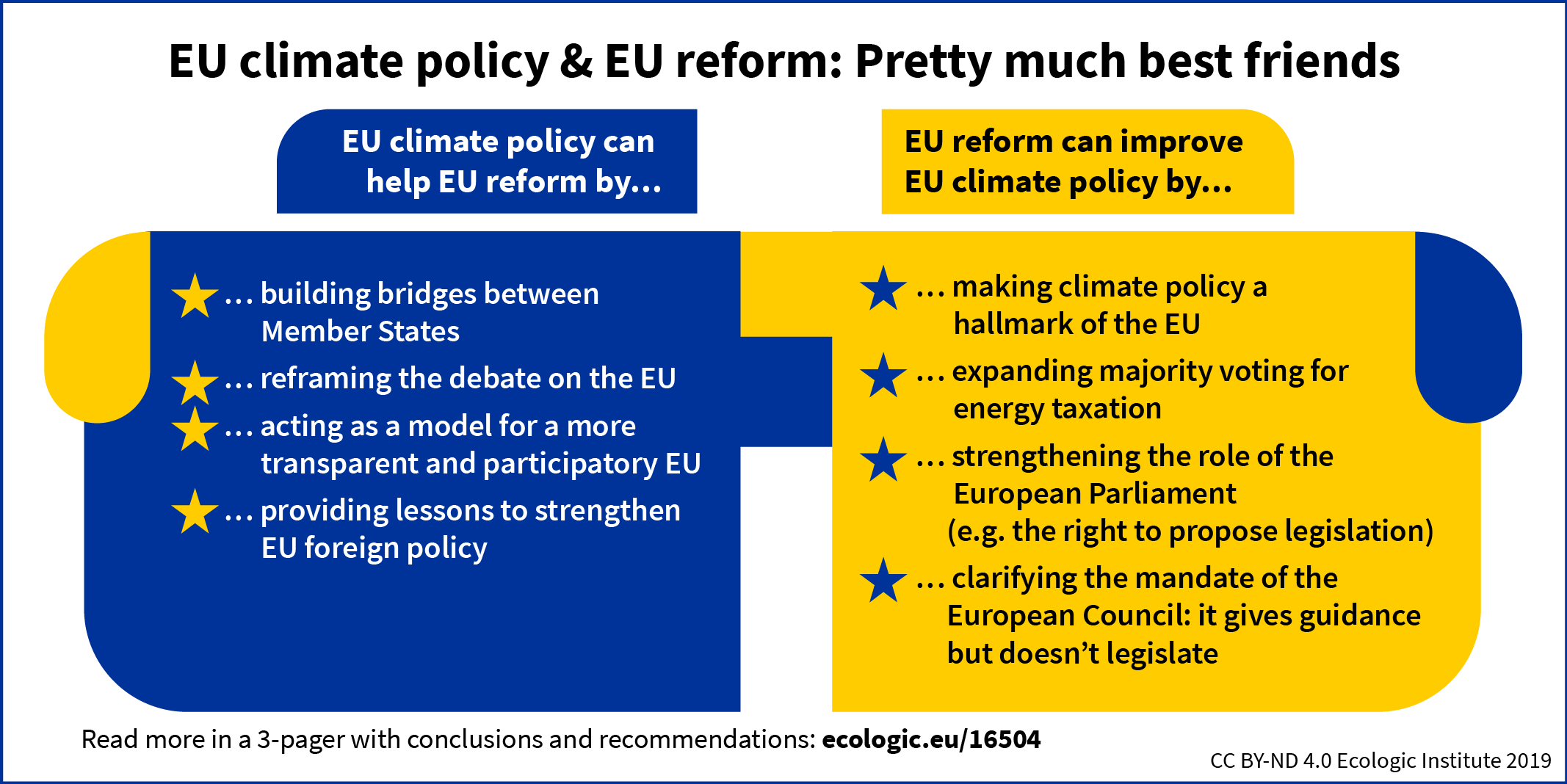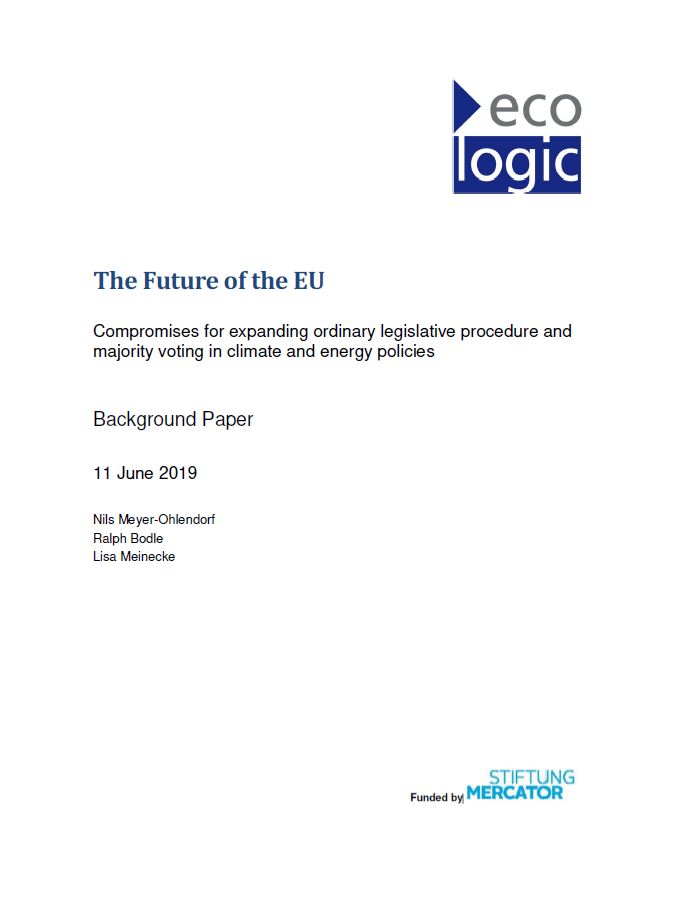The Future of the EU – the Role of Climate and Energy Policies – Empfehlungen
Conclusions
- Publikation
- Zitiervorschlag
Ecologic Institute, Istituto Affari Internazionali, Institute of European Environment Policies, the Climate Strategy Institute 2050 2019: The Future of the EU – the Role of Climate and Energy Policies. Conclusions.
Als Reaktion auf den Brexit hat die EU einen Reflexions- und ggf. Reformprozess eingeleitet, den sogenannten Bratislava-Prozess oder den Prozess der Zukunft Europas. Auf seiner Tagung am 9. Mai 2019 wird der Europäische Rat voraussichtlich erste Schlussfolgerungen zu diesem Prozess ziehen. Als Beitrag zu diesem Prozess geben das Ecologic Institut, das Istituto Affari Internazionali, das Institut für europäische Umweltpolitik und das Climate Strategy Institute 2050 eine Reihe von Empfehlungen an Entscheidungsträger, wie Klimapolitik diesen Prozess unterstützen und wie Klimapolitik von diesem profitieren kann. Die Empfehlungen stehen als Download zur Verfügung.
Kontakt
- Sprache
-
Englisch
- Autorenschaft
- Finanzierung
-
Stiftung Mercator, Deutschland - Jahr
- Umfang
- 4 S.
- Projekt
- Projekt-ID
- Inhaltsverzeichnis
-
Gesamtes Inhaltsverzeichnis
1. How climate and energy policies can support the Process on the Future of the EU
Conclusion 1: In times of tension, EU climate and energy polices build bridges between EU Member States.
Conclusion 2: Climate and energy policies help reframe the debate on the Future of the EU towards solving real problems together.
Conclusion 3: Climate and energy policies are a role model for a more transparent and participatory EU.
Conclusion 4: Climate and energy policies provide lessons that can help strengthen EU foreign policy.
Conclusion 5: EU climate and energy policies show that the EU is flexible and able to address the different needs and circumstances of Member States.2. How climate and energy policies can benefit from the Process on the Future of the EU
Conclusion 6: The Process on the Future of the EU could help make climate and energy policies a hallmark of the EU.
Conclusion 7: The Process on the Future of the EU can help make EU funding, state aid, and the financial sector more beneficial for climate and energy policies.
Conclusion 8: Using the Treaty’s passerelle clause, the Process on the Future of the EU could help expand the ordinary legislative process in EU climate policies.
Conclusion 9: Strengthening the European Parliament is good for both democracy in the EU and effective climate policies.
Conclusion 10: The European Council has at times engaged in the details of climate and energy legislation; the Process on the Future of the EU can help clarify the mandate of the European Council. - Schlüsselwörter
-
Reform, Reformprozeß, EU, Europäische UnionEuropaAnalyse
Meyer-Ohlendorf, Nils (2018). How can EU climate and energy policies support EU reform?, Ecologic Institute, Berlin.
Meyer-Ohlendorf, Nils (2018). How can EU reform strengthen EU climate and energy policies?, Ecologic Institute, Berlin.
Workshop:EU-Reform: Welche Rolle spielt die Klima- und Energiepolitik? – Tallinn
- Datum
-
- Ort
- Tallinn, Estland
Workshop:EU-Reform: Welche Rolle spielt die Klima- und Energiepolitik? – Sofia
- Datum
-
- Ort
- Sofia, Bulgarien
Workshop:EU-Reform: Welche Rolle spielt die Klima- und Energiepolitik? – Bukarest
- Datum
-
- Ort
- Bukarest, Rumänien
Meyer-Ohlendorf, Nils 2018: Reforming the EU: What Role for Climate and Energy Policies in a Reformed EU? Discussion Paper for the Working Group Meeting on 24 April 2018. Ecologic Institut: Berlin.
EU-Reform: Klimapolitik als neues Markenzeichen der EU
- Dauer
-
-
- Finanzierung
-
Bundesministerium für Umwelt, Naturschutz, Bau und Reaktorsicherheit (BMUB), Deutschland Deutsche Gesellschaft für Internationale Zusammenarbeit (GIZ), Deutschland
